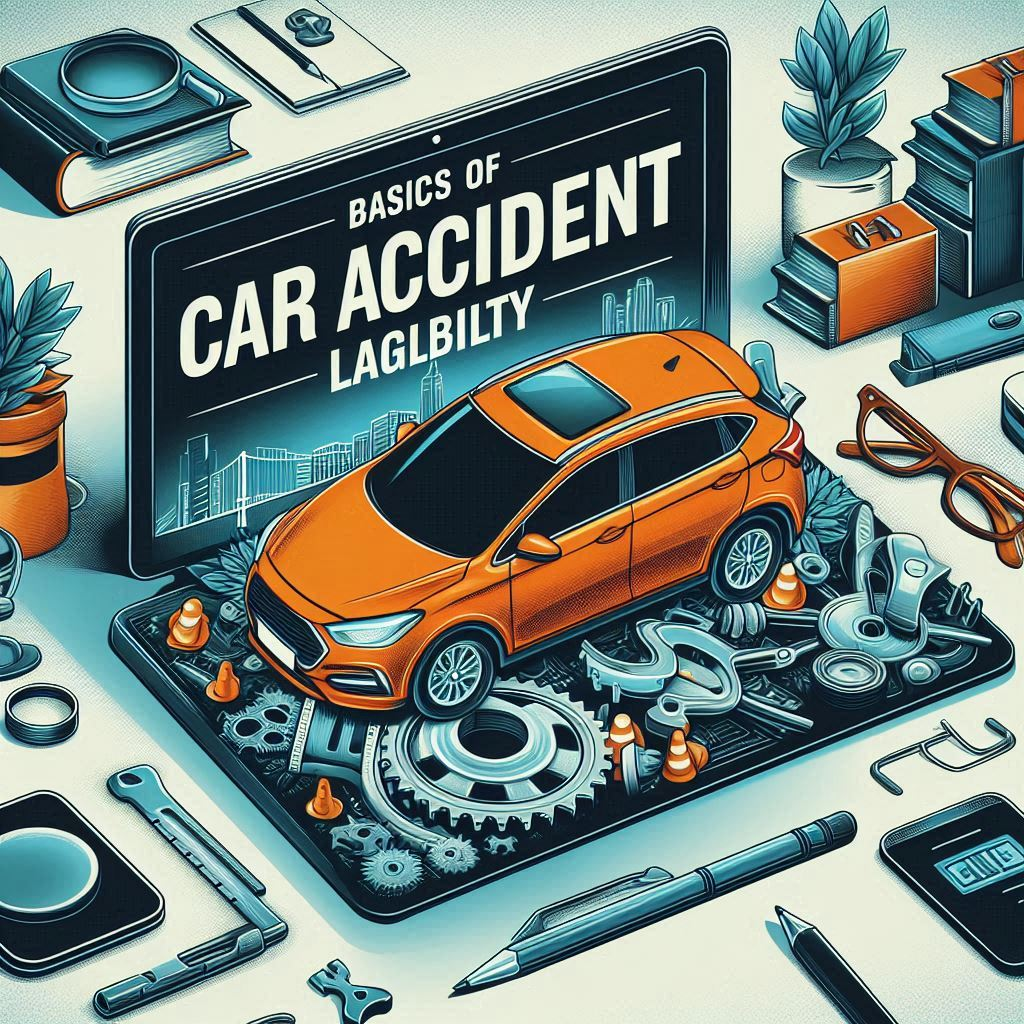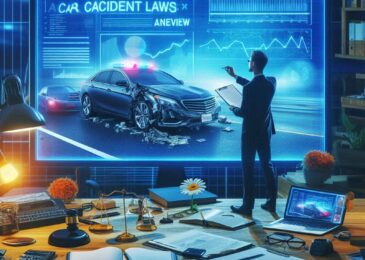Introduction
Hook: Did you know that every 60 seconds, a car accident occurs somewhere in the United States? By the time you finish reading this paragraph, another crash will have happened. Car accidents are not just common; they’re a daily reality that affects millions of lives.

Thesis Statement: In this article, we’re going to explore the basics of car accident liability, including how fault is determined, common accident scenarios, and why having a car accident lawyer on your side can be crucial. We’ll also dive into the steps you should take after an accident and provide answers to frequently asked questions. Buckle up and let’s dive in!
Understanding Car Accident Liability
What is Car Accident Liability?
Car accident liability is all about determining who’s responsible for a car crash. It involves figuring out which driver’s actions (or inactions) led to the accident. In simple terms, it’s assigning blame to the right party. This can be straightforward in some cases but quite complex in others, especially when multiple vehicles are involved or when both parties share some degree of fault.
Liability isn’t just about pointing fingers; it’s a crucial part of the legal process that influences insurance claims and legal outcomes. For instance, if you rear-end someone, you’re typically considered at fault because you didn’t maintain a safe distance. But what if the car in front of you had broken brake lights? Suddenly, liability isn’t so clear-cut.
Why It’s Important to Understand Liability After an Accident
- Financial Impact: Knowing who’s liable determines who pays for the damages. If you’re at fault, your insurance will cover the costs, but your premiums might rise. On the flip side, if the other driver is at fault, their insurance should cover your expenses. Without understanding liability, you might end up paying out of pocket for something that isn’t your fault.
- Legal Consequences: If you’re found liable, you might face lawsuits. Understanding liability helps you prepare and defend yourself. Legal battles can be lengthy and costly, and having a clear grasp of liability can help streamline the process and possibly avoid court altogether.
- Insurance Claims: Establishing liability is essential for filing and negotiating insurance claims to ensure you receive fair compensation. Insurance companies will investigate to determine who’s at fault, and your ability to present a clear case can significantly impact your settlement.
- Hiring a Car Accident Lawyer: A car accident lawyer can help you navigate liability issues, protect your rights, and fight for fair compensation. Lawyers can provide expert guidance, handle communications with insurance companies, and represent you in court if necessary.
- Peace of Mind: Knowing who’s at fault can reduce stress and help you make informed decisions post-accident. It can also prevent you from making mistakes that could complicate your case or reduce your compensation.
Factors Determining Liability
- Negligence: Negligence is about failing to exercise reasonable care while driving. If a driver’s negligence caused the accident, they’re likely to be found liable. This includes actions like distracted driving (e.g., texting while driving), speeding, and failing to obey traffic signals. The concept of negligence can be broken down further:
- Duty of Care: Every driver has a legal obligation to operate their vehicle safely and follow traffic laws.
- Breach of Duty: When a driver fails to meet this standard of care, they breach their duty.
- Causation: There must be a direct link between the breach of duty and the accident.
- Damages: The accident must result in actual damages, whether to property or to a person.
- Fault: Fault is assigned based on evidence and witness statements. It can be shared if multiple parties contributed to the accident. For example, in a multi-vehicle pileup, several drivers might share liability, depending on their actions leading up to the crash. Comparative fault laws in some states allow you to recover damages even if you’re partially at fault, though your compensation might be reduced by your percentage of fault.
- Traffic Laws: Breaking traffic laws, like running a red light or speeding, can significantly affect liability. If a driver broke a law, they are more likely to be found at fault. Traffic law violations are often straightforward to prove with evidence from traffic cameras, witness statements, and police reports.
Common Scenarios and Liability
- Rear-End Collisions
- Typical Liability: The driver who rear-ends another vehicle is usually at fault because they failed to maintain a safe following distance. This is often considered a clear case of negligence.
- Exceptions: If the front driver stopped suddenly without reason, had faulty brake lights, or was driving erratically, the rear driver might not be fully liable. For example, if the front car stopped suddenly to avoid an animal or due to an emergency, liability might be shared.
- Intersection Accidents
- Liability: Determined by right-of-way rules and traffic signals. For instance, if a driver runs a red light or fails to yield at a stop sign, they’re typically at fault.
- Examples:
- Running a Red Light: If Driver A runs a red light and hits Driver B, Driver A is at fault.
- Failing to Yield: If Driver A turns left without yielding to oncoming traffic and hits Driver B, Driver A is at fault.
- Four-Way Stop: If two cars arrive at a four-way stop simultaneously and collide, liability depends on who had the right of way.
- Multi-Vehicle Pileups
- Complexity: Liability can be shared among multiple drivers. These accidents are often complex due to the chain reaction nature of the crashes.
- Role of a Lawyer: A car accident lawyer can help untangle the complex web of fault in these cases. They can investigate the sequence of events, gather evidence, and identify all parties involved to ensure that liability is fairly assigned.
The Role of a Car Accident Lawyer
- When to Hire a Car Accident Lawyer
- Situations: Severe injuries, disputed fault, or complex accidents. If the accident involves significant property damage or injuries, a lawyer can help ensure you get the compensation you deserve.
- Misconceptions: Many think lawyers are only for court, but they can also help with settlements and negotiations. A good lawyer can often resolve your case without going to court, saving you time and stress.
- How a Car Accident Lawyer Can Help
- Legal Expertise: Lawyers understand the intricacies of car accident laws. They can provide valuable advice on how to proceed with your case.
- Evidence and Negotiation: They can gather evidence and negotiate with insurance companies on your behalf. This includes collecting police reports, medical records, witness statements, and other crucial evidence to build a strong case.
- Choosing the Right Car Accident Lawyer
- Tips: Look for experience, good reviews, and local expertise. A lawyer with a solid track record in car accident cases and knowledge of local laws and court systems will be more effective.
- Resources: Search for a “car accident lawyer near me” to find local help. Local lawyers are often more familiar with the specific laws and regulations in your area and can offer more personalized service.
Steps to Take After a Car Accident
- Immediate Actions
- Steps: Check for injuries, call the police, and gather evidence. Your first priority should always be safety. Check yourself and others for injuries and call 911 if anyone is hurt.
- Importance: Collecting contact information and evidence at the scene is crucial. Take photos of the scene, exchange information with the other driver(s), and get contact details for any witnesses.
- Dealing with Insurance Companies
- Reporting: Notify your insurance company promptly. Provide them with all the necessary details about the accident.
- Communication: Be cautious about what you say to adjusters to avoid jeopardizing your claim. Stick to the facts and avoid admitting fault. Insurance adjusters might try to get you to say something that could be used against you.
- Legal Considerations
- Overview: Understand the process of filing a claim or lawsuit. This can include gathering evidence, filing paperwork, and possibly going to court.
- Statute of Limitations: Be aware of the time limits for filing car accident claims in your state. These laws vary by state and can range from one to several years.
Frequently Asked Questions (FAQ)
- What should I do if I’m partially at fault for the accident?
- You can still file a claim, but your compensation might be reduced based on your percentage of fault. Many states follow comparative negligence rules, where your compensation is adjusted according to your level of fault.
- Can I handle a car accident claim without a lawyer?
- It’s possible, but a lawyer can provide expertise and increase your chances of a favorable outcome. Especially in complex cases or when serious injuries are involved, a lawyer’s assistance can be invaluable.
- How long does it take to resolve a car accident claim?
- It varies; simple claims might resolve quickly, while complex ones can take months or even years. Factors that affect the timeline include the severity of injuries, the complexity of the accident, and the willingness of parties to settle.
- What compensation can I receive for a car accident?
- Compensation can cover medical bills, car repairs, lost wages, and pain and suffering. In some cases, you might also receive compensation for future medical expenses and loss of earning capacity.
- How can a car accident lawyer help me if the other driver is uninsured?
- They can explore other avenues for compensation, like uninsured motorist coverage or suing the at-fault driver. Uninsured motorist coverage can be part of your own insurance policy and can provide compensation when the other driver lacks insurance.
Conclusion
Summary: We’ve covered the essentials of car accident liability, from understanding fault to knowing when to hire a car accident lawyer. Remember, being informed about your rights and responsibilities can make a significant difference in the aftermath of an accident.
Call to Action: If you’ve been in an accident, don’t navigate the aftermath alone. Consult a car accident lawyer for expert advice and representation. They can help ensure you get the compensation you deserve and protect your legal rights.
Final Note: Remember, with the right support, you can successfully handle the challenges that come after a car accident. Stay informed and stay safe! Having a trusted lawyer on your side can provide peace of mind and help you navigate the complex world of car accident liability with confidence.



